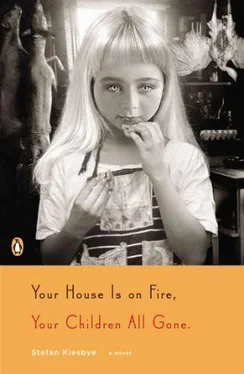“Karin, my sweet Karin,” Holger murmured, his hands down his pants, his branch shaking. One October night he fell out of the tree, his hand still around his prick, and broke that arm and a leg. We jumped off our own branches and bent over moaning Holger, not able to decide whether he was ecstatic or in serious pain; his face was bent into a grin.
“We could ring their bell and ask for help,” Christian suggested.
“And what would we tell them we were doing?” I scolded.
Finally we lifted Holger off the ground and carried him to Dr. Habermann, who cursed us while assessing the damage. “She put a spell on me,” Holger later told every boy in school, but that didn’t deter him from reclaiming his lookout once the casts were off.
Waltraud was the youngest daughter, and, Christian swore, the one he would marry. I didn’t care much for her or for Karin. I was mortally in love with Heike, plump as her mother, with light-blue eyes and heavy breasts. She was seventeen, I was fourteen. Worlds divided us, even though I was already taller than she was.
If I spotted Heidrun Brodersen in front of one of our stores, I went up to her and asked if she needed help with her bags.
“That’s nice of you, Martin,” she said, and my ears were full of bees. If she knew who pissed in her yard, and who sat in the trees trying to steal a glimpse of her daughters, she didn’t let on.
“Your mother says you’re doing well in school. She’s very proud of you,” she said.
I nodded, lifting her bags, hoping none of my friends would see me. Heidrun asked me about my plans for after school, my hobbies, and if I already had a girlfriend, and I stuttered and mumbled, and my face glowed with embarrassment. When I put down her bags at her door, she asked, “You want some water? Some chocolate?”
I nodded yes, then ran off anyway.
Peter Brodersen, Heidrun’s husband, was as big and gentle as his wife, but a dullard. He was well liked and a failure. He’d had to sell his farm and, after paying off his debts, went to work as a peat cutter for the new owner.
On nights when people bought him drinks at Frick’s Inn, he’d sigh. His heavy face would glow and he’d say that if only his wife had given him sons, he’d still be farming and buying drinks for his friends. “Women,” he said. “I’m surrounded by women.”
Nevertheless, the Brodersens didn’t seem to be in need. The dresses of Karin, Heike, and Waltraud were new and clean, and Heidrun Brodersen never went out without a hat of the latest fashion, her plump little feet stuck in delicate shoes. She was quite something.
My mother, with hazel eyes that softened her features, had nothing good to say about her. Her house wasn’t as clean as it ought to be, she wasn’t a great cook, and she seemed too pleased with the impression she made on men. “Who is she dressing up like that for?” she said. Mom herself had rheumatism and bandaged her legs and was the only woman in the village to wear pants. “Who is that woman after?” she asked.
In the winter we abandoned our high perches, and we saw little of Heidrun, who every year around Christmastime grew sick and stayed indoors. After the first snow, should we stand yearning outside the Brodersens’ kitchen, watching the family eat a stew or some fried potatoes, we pissed hearts into the flowerpots, each one a sign of our undying love and lust.
Around Christmas Peter Brodersen was always in a foul mood. His wife sick, he was seen all too often at Frick’s and, even though he couldn’t afford it, drank with whoever was willing to keep him company into the wee hours.
“He’s drinking away his daughters’ future,” people in Hemmersmoor said. The women talked about him in the bakery, shaking their heads. “He’s no good. He has a sick wife, three daughters. What is he doing at Frick’s all night? He should be at home.”
The men in Hemmersmoor sided with Peter. Whenever the women in the bakery got too loud, the baker would come and scold them. “He’s a decent fellow,” he said. “Thick, yes, but decent. He’s the best man Heidrun could wish for.” The apothecary, too, had only kind words for Peter. “He has character. Fate has dealt him bad cards, but he doesn’t complain.” Men and women in Hemmersmoor disagreed, and disagreement focused everyone’s eyes on the Brodersens’ small house. As for us, the boys, we couldn’t have cared less about Peter. We could not fathom how a dullard like him could have produced three daughters like these, and the less we saw of him, the better.
In the spring Heidrun Brodersen reappeared in her garden, planting flowers. She seemed thinner, though not thin, after her long sickness, but she looked as striking as ever. The first time she walked into the bakery, she wore a green hat with feathers and rhinestones, and by midafternoon it was all Hemmersmoor could talk about. Yet something had changed during the winter, and when Heidrun planted a new rosebush in another flowerpot in her garden, people did not stop to chat with her. They did not congratulate her on her green thumb.
With the few hairs sprouting from my cheeks and chin long enough to call a beard, I ran after Heike one afternoon. “Hey,” I called out.
Heike turned around. She was a summer landscape in full bloom. She had a boyfriend now, a nineteen-year-old who drove an old Opel and worked at Brümmer’s factory. “What is it, Martin?” she asked.
“I… I wanted to ask you. You know, the carnival is coming to town soon, and maybe you’d like to go.”
Her eyes, so light they seemed to water even at night, blinked a few times, as though I were so paper thin that she had a hard time seeing me. “I can’t,” she said.
“You’re going with Rüdiger?” I asked.
She smiled. “Yes.”
I stepped up to her and, before she could avert her face, planted a kiss on her lips.
“What was that?” she asked.
“A kiss,” I said stupidly.
“I’d like to go to a dance,” she said. “Why don’t you ask me out sometime?” Then she turned and walked away. I waited several minutes before I could feel my legs again. My heart beat in my throat, and I couldn’t eat for the rest of the day.
When my mother was told that I had been seen talking to Heike, she sat me down and said that the Brodersen girls were not for boys like me. Heike was too old, too experienced.
Yes, I would have said, exactly, but I heard her out; any opposition would have further raised my mother’s voice and prolonged her already long speech. In the evening she told my father. He sighed and said, “Your mother is right. The Brodersens are not bad, but you should not go after an older girl.”
“That’s it?” my mother said. “That’s all you have to say?”
My father, the Gendarm , was a bulky man, with red skin and red hair, and his hands, though small, could squeeze all life out of you. “He’s young,” he said. “He’s not marrying her.”
My mother gasped and glowered. “You always stick together,” she then said. “You and Penck and the others. You buy drinks for Peter so he keeps his mouth shut. Don’t think I don’t know what’s going on.”
———
Maybe our love for her daughters rendered us deaf to the rumors that were widely traded. Maybe the complaints the women of Hemmersmoor had about Heidrun had always been more than gossip, and we had simply not understood their meaning. It might have been jealousy that finally caused the confrontation, or it might have been money, yet what I remember is Heidrun’s green hat, the feathers moving in sync with her steps. Whatever it was that upset the fine balance Hemmersmoor had kept, we never felt it coming.
On August 2 the weather was humid and the sky full of lead. Everyone in the village acted nervous, and my limbs ached because I was growing a centimeter every month. A few of us stood in the village square, smoking, when Käthe Grimm bit my father’s hand. She was a ghost seer, but in the last few weeks she had acted especially peculiar. One day she appeared in an expensive dress and reeked of perfume, and the next she was screaming about dead children following her every step. Today she had begged my father to arrest the ghosts, and when he finally tried to lead her home—more and more people had gathered to laugh at her—she attacked him.
Читать дальше












